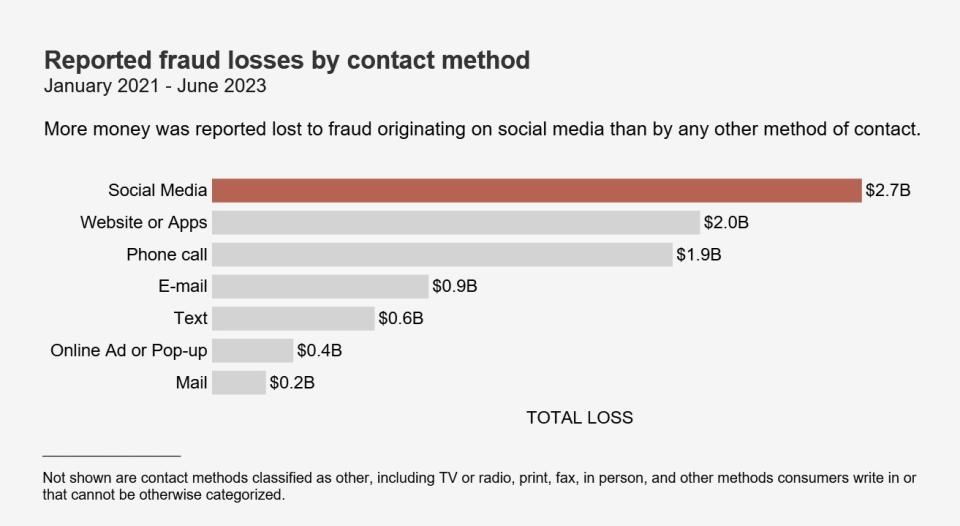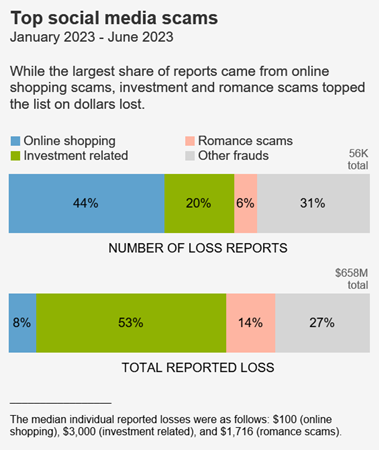Consumers Lost $2.7 Billion to Social Media Scams Since 2021

A report from the US Federal Trade Commission reveals that scams originating on social media have accounted for $2.7 billion in reported losses since 2021.
One in four people who reported falling victim to fraudsters since 2021 said the crime started on social media. The numbers are particularly high among younger demographics. For example, in the first six months of 2023, fraud reports filed by victims aged 20-29 said social media was the contact method more than 38% of the time. For people 18-19, the figure was 47%. The FTC notes that this is also due to generational differences in social media use.
Also in the first half of 2023, the most frequently reported type of loss due to fraud was an attempt to buy something marketed on social media, accounting for 44% of all social media fraud loss reports. Victims reported undelivered goods, with no-show clothing and electronics topping the list. These scams most often start with an ad on Facebook or Instagram, according to the report.

The largest share of dollar losses stems from fake investment opportunities. More than half the money reported lost to fraud on social media went to investment scammers in the first half of 2023.
Scammers promote their own supposed investment success and work to lure people onto investment websites and apps that turn out to be fake.
Romance scams generated the second-highest amount of losses on social media, with half of people who reported losing money to an online romance scam saying it began on Facebook, Instagram or Snapchat.

Since most victims actually don’t report their experience to the feds, these numbers are likely much higher in reality.
“Social media gives scammers an edge in several ways,” says Emma Fletcher, a senior researcher with the commission. “They can easily manufacture a fake persona, or hack into your profile, pretend to be you, and con your friends. They can learn to tailor their approach from what you share on social media. And scammers who place ads can even use tools available to advertisers to methodically target you based on personal details, such as your age, interests, or past purchases. All of this costs them next to nothing to reach billions of people from anywhere in the world.”
The FTC recommends you limit who can see your posts and information on social media and to be wary of strange, unsolicited communications – even if they seem to come from people you know.
Bitdefender offers its own set of recommendations and best practices in the Spam Trends of the Week report, which looks at some of the most prevalent online scams targeting regular users today, such as crypto deposit gimmicks, bogus Amazon Prime cancellation emails, fake prizes from Costco, and natural disaster relief scams.
Bitdefender Total Security can protect you from scams by leveraging anti-fraud and anti-phishing technologies.
tags
Author
Filip has 15 years of experience in technology journalism. In recent years, he has turned his focus to cybersecurity in his role as Information Security Analyst at Bitdefender.
View all postsRight now Top posts
Outpacing Cyberthreats: Bitdefender Together with Scuderia Ferrari HP in 2025
March 12, 2025
Streamjacking Scams On YouTube Leverage CS2 Pro Player Championships to Defraud Gamers
February 20, 2025
How to Identify and Protect Yourself from Gaming Laptop Scams
February 11, 2025
Your Device ‘Fingerprint’ Will Go to Advertisers Starting February 2025
December 24, 2024
FOLLOW US ON SOCIAL MEDIA
You might also like
Bookmarks







